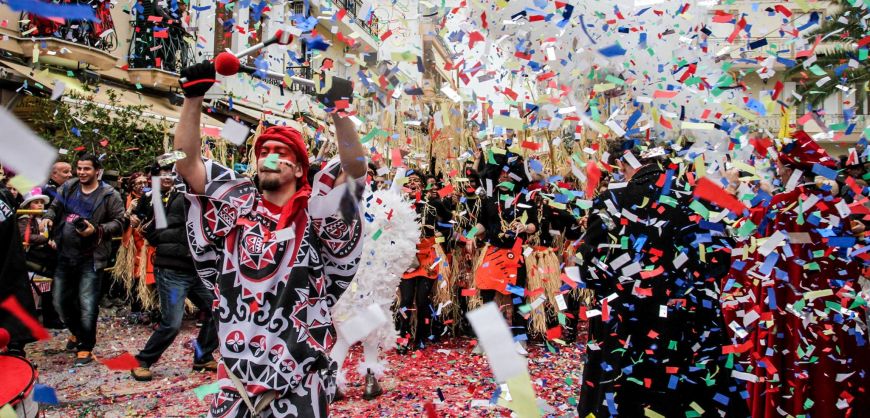On March 1-2, Athens will kick off Greece’s extravagant Carnival celebrations with masquerade parading on the streets of the capital during the day, and blow-out parties at night.
Greece’s Carnival season, known as “Apokries,” is a celebration held across the country, traditionally held ten weeks before Greek Orthodox Easter. It culminates on the weekend before “Clean Monday,” (Ash Monday) the first day of Lent, which is on March 3 this year.
The Carnival season primarily features the wearing of masks and disguising clothes as the central theme every year to symbolise peoples anonymity and freedom of expression during this period.
An extensive programme of events have been co-created for this year’s Carnival season by the Culture, Sports & Youth Organisation of the City of Athens (OPANDA) together with Technopolis City of Athens.
The carnival agenda will feature events for kids and adults alike, celebrating unity on this special day. According to the Greek Reporter, events will include: concerts, music tours, serenades, performances and parades, revival of traditional Athenian carnival customs, treasure hunt, dancing, satirical songs, tarantella dance sessions, guitars, mandolins, ocarinas and bass drums along with afro-brazilian percussions.
Although the Athens carnival isn’t known for its parades and floats, people are likely to find other unique carnival festivities in Athens that don’t take place elsewhere.
Between Friday, February 28 and Sunday, March 1, well-known musical artists, among them Glykeria, Eleni Tsaligopoulou and Melina Kana, will give concerts under the Acropolis Hill.
On Monday March 2, Athenians will flock to Philopappou Hill opposite the Acropolis with their picnic baskets and kites to celebrate the “koulouma” tradition. Kites have been a symbol of purity and a way for the soul to approach the divine since ancient times, and a celebrated again on this special festival period.
By afternoon, kites of all colours brighten the sky over Athens. Meanwhile, Greeks everywhere will be wishing each other, Kali Sarakosti or “Happy Lent”.
The Greek name Apokries means abstention from meat, because after the carnival festival, the period of Easter Lent begins.
The festival is largely inspired by events held by the Greek god Dionysos, the ancient Greek god of wine, fun and fertility. Even today, in certain local carnivals, like that of Tyrnavos, fertility and the phallus are celebrated, and related songs are sung.
“Another great opportunity to see Athens dressed in colours and festivities. We have carefully designed a number of Carnival events, so that Athenians of all ages as well as our visitors feel that they belong here. It’s the Carnival itself which has this familiar, sweet taste of tradition while at the same time is in an open dialogue with the fresh and the new! It’s the Carnival itself that’s not afraid to have fun, to dress up in the craziest colours and laugh out loud,” Mayor of Athens, Kostas Bakoyannis, reports to AMNA.
